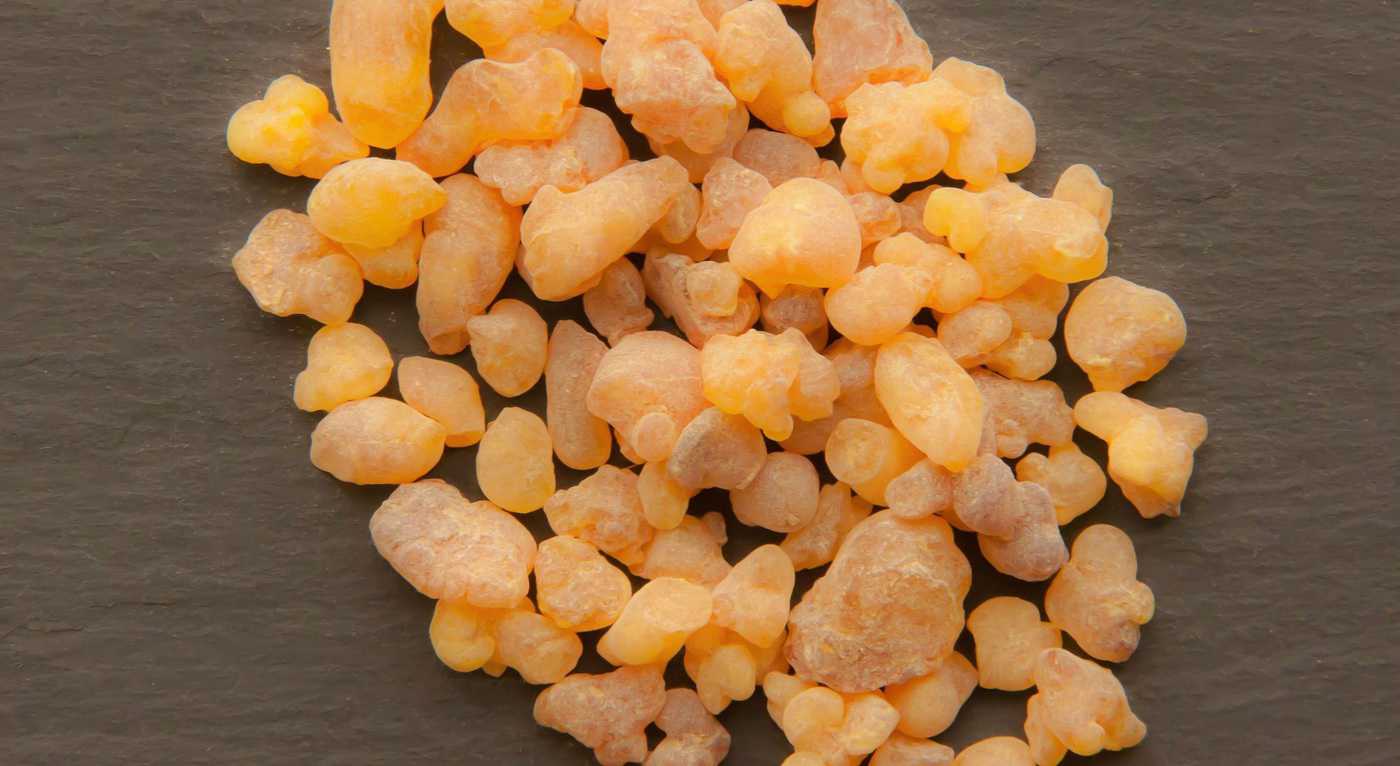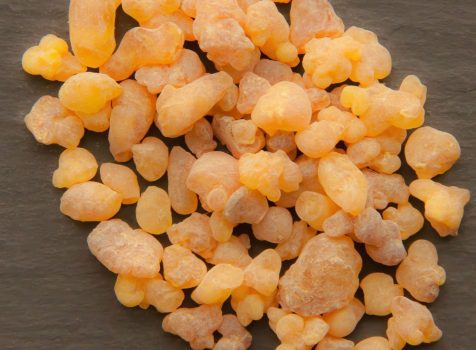Can Boswellia serrata or Frankincense Oil support natural cancer treatment?
For over 5,000 years, Boswellia and frankincense oil have been used in natural medicine. It was used to support the immune system, fight infection and cure disease, and even to treat cancer.
Benefits of Boswellia serrata and Frankincense Oil
The chemical structure of boswellic acids closely resembles that of steroids. However, the actions of boswellic acids are different and do much more than only mask symptoms.[note]Vgl. Literatur 1-4[/note] Today, the most common benefits of boswellia include:
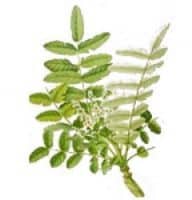
- reduces inflammation
- contains potential cancer-fighting properties
- increases spiritual awareness
- boosts immunity
- fights infections
- improves anxiety
- heals skin and reduces acne and scarring
The boswellia tree creates a precious resin that has been used in perfumes and natural medicines for long. Oil produced from this resin is called “frankincense oil”. However, there are a few different subtypes of the boswellia tree, each producing resins with slightly different medicinal components. Frankincense can come from any boswellia tree, but boswellia trees can vary greatly in the type of extracts that they produce. Boswellia serrata is the most potent source of “boswellia extract”, whereas Boswellia carteri is what most people refer to as “frankincense oil”.
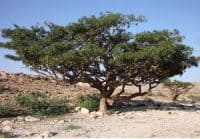
While the extract and the oil may come from different boswellia trees, they are both powerful medicines. Boswellia carteri to which I will refer as frankincense from now, is typically considered a Middle Eastern herb. As it turns out, Boswellia extract and frankincense oil shows a variety of ways to interfere with tumors. Research has shown that they can stop the progression of: breast, pancreatic, and bladder cancer cells.[note]Cf. references 16, 17[/note] Aside from fighting cancer, the compounds have also been researched for liver and brain cell protection as well as anti-inflammatory abilities as a potential treatment for inflammatory diseases such as Crohn’s disease, ulcerative colitis, or chronic Lyme disease.
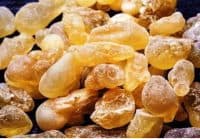
Boswellia serrata extract (to which I will simply refer as “boswellia” from now on) is one of a few, and certainly one of the most effective, inhibitors of 5-LOX inflammation. 5-LOX (5-lipoxygenase) enzyme activity leads to tumor formation and inflammatory digestive, respiratory, and cardiovascular conditions. One of the primary beneficial anti-inflammatory compounds in boswellia is AKBA (acetyl-11-keto-B-boswellic acid). AKBA’s strength has been shown in laboratory studies where it has inhibited the replication of leukemia and prostate cancer cells, oral pathogens and bacteria, pain from osteoarthritis, and the release of NF-kB – a marker for many diseases, including clogged arteries.[note]Cf. references 14, 15[/note]
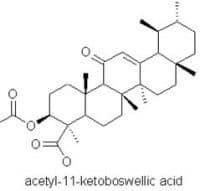
When choosing a Boswellia extract, the standardization for AKBA is essential. As I mentioned, one of boswellia’s most powerful components is AKBA. Therefore it is so often in the focus of research. However, there is another compound in boswellia that is actually pro-inflammatory. It is called beta-boswellic acid (BBA). The Boswellia extract that I recommend is standardized to 10% AKBA and has virtually no beta-boswellic acids. The dosage of a combination of Boswellia serrata and Boswellia carteri is 300 – 3000 mg per day.
Using the compound AKBA (acetyl-11-keto-beta-boswellic acid) research has for the first time shown that boswellia has the ability to target cancer cells in late-stage ovarian cancer patients. Other compounds found in boswellia have been proved to be beneficial in test tubes when treating cancer cells.[note]Cf. references 21, 17[/note]
Potential Cancer-Killing Properties
Because of its anti-inflammatory properties Boswellia serrata has been used in folk medicine for several health concerns, including asthma, gastroenteritis and skin conditions. New research has shown that Boswellia extract and frankincense may be a potential treatment for brain, breast, colon, pancreatic, prostate and stomach cancers. Research trials are filling medical journals like Carcinogenesis and PLoS One about boswellia serrata’s cancer-targeting process.[note]Cf. references 2, 3[/note]
As for instance demonstrated at Baylor University Medical Center in Dallas, the potential cancer-killing properties are in part due to its regulation of the cellular epigenetic machinery. This highlights its ability to influence genes to promote healing which makes Boswellia a viable candidate for both the prevention and treatment of cancer.
Natural Treatment of Cancer with Boswellia (Frankincense Oil)
People who added Boswellia serrata into their cancer care plan may find themselves experiencing double-benefits from this amazing substance. Why? For many cancer patients, the time comes when the treatment becomes worse than the cancer itself. It is at this point that quality of life and symptom suppression are the focal points for many diagnosed with the disease. Debilitating in and of itself, often the side effects of conventional cancer treatment can make having cancer absolutely miserable.
Take, for instance, brain cancer patients who experience cerebral edema (swelling in the head) after having their tumors irradiated. Typically, these people are treated with dexamethasone and other corticosteroids to control the swelling. However, this can be done only for a limited time, because the side effects limit long-term use. Unfortunately in this phase patients may suffer of toxic overload from the drugs that are supposed to help them in the first place.
Thankfully, frankincense or boswellia serrata offers a potential natural medicine. Back in 2011, the journal Cancer published the results of a 44-person clinical trial evaluating how brain swelling was affected by Boswellia.[note]Cf. reference 10[/note] Astoundingly, 60% of the patients showed 75% reduction or greater in cerebral swelling after being treated with 4,200 milligrams per day of Boswellia extract. These results are so significant that scientists are urging the medical community to consider prescribing this potent supplement of steroids for cancer patients assigned to radiation treatment.
Boswellia Benefits Immune Function
In a study published by Phytotherapy Research, for instance, when mice took 1–10 milligrams of Boswellia serrata orally, researchers discovered that multiple levels of their immune systems were stimulated[note]Cf. reference 6[/note], including:
- delayed hypersensitivity reaction (early 24 hours, delayed 48 hours)
- IgG
- IgM
- cytokines (interferon gamma, interleukin-4, and tumor necrosis factor-alpha)
- T-cell interactions (i.e. CD4/CD8, which are generally low in AIDS patients
Boswellia can significantly boost the immune system. Two fundamental ways this is accomplished is by proliferating lymphocytes (white blood cells, which are the body’s primary defense team) and by keeping inflammation under control. Chronic inflammation is the primary risk factor for most chronic diseases including cancer. This may also explain why Boswellia is effective in helping treat allergic or autoimmune conditions like bronchial asthma, Crohn’s disease, rheumatoid arthritis, Lyme disease, and ulcerative colitis.
By implementing boswellia into the natural health regimen one will soon feel how it benefits the immune function especially when using the extract orally and the oil in a different way. Restoring and stimulating the immune system in this way can be very important especially for Lyme patients after the eradication of their Borrelia by whole body hyperthermia. But you can also take Boswellia serrata as a supplement to help with many other health conditions, with a few frankincense oil drops placed under your tongue or on the roof of your mouth together with the powder capsule.
References
- Dahmen U, Gu YL, Dirsch O, et al: Boswellic acid, a potent anti-inflammatory drug, inhibits rejection to the same extent as high dose steroids. Transplant Proc 33:539-541, 2001.
- Frank MB, Yang Q, Osban J, et al: Frankincense oil derived from Boswellia carteri induces tumor cell specific cytotoxicity. BMC Complement Altern Med 9:6, 2009.
- Gupta I, Parihar A, Malhotra P, et al: Effects of Boswellia serrata gum resin in patients with ulcerative colitis. Eur J Med Res 2:37-43, 1997.
- Gupta I, Gupta V, Parihar A, et al: Effects of Boswellia serrata gum resin in patients with bronchial asthma: Results of a double-blind, placebo-controlled, 6-week clinical study. Eur J Med Res 3:511-514, 1998.
- Chande N, MacDonald JK, McDonald JW: Interventions for treating microscopic colitis: A Cochrane Inflammatory Bowel Disease and Functional Bowel Disorders Review Group systematic review of randomized trials. Am J Gastroenterol 104:235-241, 2009.
- Chrubasik JE, Roufogalis BD, Chrubasik S: Evidence of effectiveness of herbal antiinflammatory drugs in the treatment of painful osteoarthritis and chronic low back pain. Phytother Res 21:675-683, 2007.
- Ammon HP. Boswellic acids in chronic inflammatory diseases. Planta Med 2006; 72(12): 1100-16.
- Bible History Daily. Why Did the Magi Bring Gold, Frankincense and Myrrh? Available at: https://www.biblicalarchaeology.org/daily/people-cultures-in-the-bible/jesus-historical-jesus/why-did-the-magi-bring-gold-frankincense-and-myrrh/.
- Khajuria A, et al. Immunomodulatory activity of biopolymeric fraction BOS 2000 from Boswellia serrata. Phytother Res 2008; 22(3): 340-8.
- Kirste S, et al. Boswellia serrata acts on cerebral edema in patients irradiated for brain tumors: a prospective, randomized, placebo-controlled, double-blind pilot trial. Cancer 2011; 117(16): 3788-95.
- Park B, et al. Boswellic acid suppresses growth and metastasis of human pancreatic tumors in an orthotopic nude mouse model through modulation of multiple targets. PLoS One. 2011; 6(10): e26943 [epub].
- Suhail MM, et al. Boswellia sacra essential oil induces tumor cell-specific apoptosis and suppresses tumor aggressiveness in cultured human breast cancer cells. BMC Complement Altern Med 2011; 11: 129.
- Takahashi M, et al. Boswellic acid exerts antitumor effects in colorectal cancer cells by modulating expression of the let-7 and miR-200 microRNA family. Carcinogenesis 2012; 33(12): 2441-9.
- University of Leicester. Christmas gift brings treatment hope for cancer patients. Available at: http://www2.le.ac.uk/offices/press/press-releases/2013/december/christmas-gift-brings-treatment-hope-for-cancer-patients.
- Yuan Y, et al. Acetyl-11-keto-beta-boswellic acid (AKBA) prevents human colonic adenocarcinoma growth through modulation of multiple signaling pathways. Biochim Biophys Acta 2013; 1830(10): 4907-16.
- Zhang YS, et al. Acetyl-11-keto-β-boswellic acid (AKBA) inhibits human gastric carcinoma growth through modulation of the Wnt/β-catenin signaling pathway. Biochim Biophys Acta 2013; 1830(6): 3604-15.
- Frank, M. B., Yang, Q., Osban, J., Azzarello, J.T., Saban, M.R., Saban, R., Ashley, R.A., Welter, J.C., Fung, K.-M., and Lin, H.-K.: Frankincense oil derived from Boswellia carteri induces tumor cell specific cytotoxicity. BMC Comple. Altern. Med. 9: 6, 2009. PMID: 19296830.
- Wu, S., Patel, K.B., Booth, J.L., Metcalf, J.P., Lin, H.-K., Wu, W.: Protective essential oil attenuates influenza virus infection in MDCK cells. BMC Comple. Altern. Med. 10: 69, 2010. PMID: 21078173.
- Suhail, M.M., Wu, W., Cao, A., Mondalek, F.G., Fung, K.-M., Shih, P.-T., Fang, Y.-T., Woolley, C., Young, G., and Lin, H.-K.:Boswellia sacra essential oil induces tumor cell-specific apoptosis and suppresses tumor aggressiveness in cultured human breast cancer cells. BMC Comple. Altern. Med. 11: 129, 2011. PMID: 22171782.
- Woolley, C.L., Suhail, M.M., Smith, B.L., Boren, K.E., Taylor, L.C., Schreuder, M.F., Chai, J.K., Casabianca, H., Haq, S., Lin, H.-K., Al-Shahri, A.A., Al-Hatmi, S., Young, D.G.: Chemical differentiation of Boswellia sacra and Boswellia carterii essential oils by gas chromatography and chiral gas chromatography-mass spectrometry. J Chromatogr A. 1261, 158-163, 2012. PMID: 22835693.
- Ni, X., Suhail, M.M., Yang, Q., Cao, A., Fung, K.-M., Postier, R.G.,Woolley, C., Young, G., Zhang, J., and Lin, H.-K.: Frankincense essential oil prepared from hydrodistillation of Boswellia sacra gum resins induces human pancreatic cancer cell death in cultures and in a xenograft murine model. BMC Comple. Altern. Med. 12, 253, 2012. PMID: 23237355.
- Fung, K.-M., Suhail, M.M., McClendon, B., Woolley, C.L., Young, D.G., and Lin, H.-K.:Management of basal cell carcinoma of the skin using frankincense (Boswellia sacra) essential oil: A case study. OA Altern. Med. 1, 14,
- Lin, H.-K., Suhail, M. M., Fung, K.-M., Woolley, C.L., and Young, D.G: Extraction of biologically active compounds by hydrodistillation of Boswellia species gum resins for anti-cancer therapy. OA Altern. Med. 1, 4, 2013.

